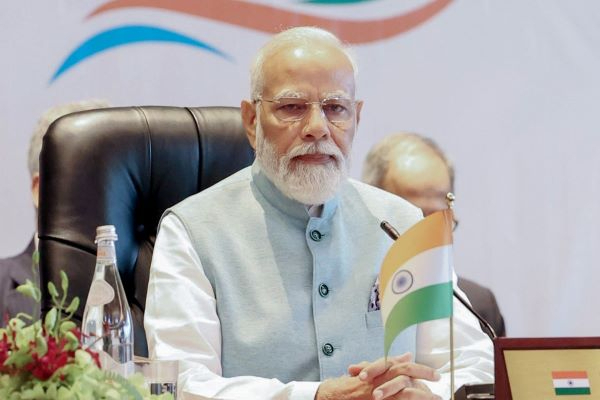India has made significant strides in several sunrise domains including green hydrogen, quantum computing, deep sea research, and critical minerals

Prime Minister Narendra Modi announced the launch of the Research, Development and Innovation Scheme, with an allocation of Rs. 1 lakh crore while addressing the Emerging Science, Technology and Innovation Conclave (ESTIC) 2025 at Bharat Mandapam in New Delhi.
He emphasized that efforts are being made to promote research and development in the private sector as well. “For the first time, capital is being made available for high-risk and high-impact projects”, stated Modi.
He noted that in the 21st century, there was a pressing need for global experts to come together and deliberate on emerging science, technology, and innovation to provide direction. This need, he said, gave birth to an idea, which evolved into the vision for this Conclave. He expressed happiness that the vision is now taking shape through this Conclave.
Underlining that the 21st century is a period of unprecedented transformation, Modi remarked that the global order is witnessing a new shift, and the pace of change is not linear but exponential. With this perspective, India is advancing various aspects related to emerging science, technology, and innovation, maintaining a consistent focus on them.
As an example, he highlighted the area of research funding and the Prime Minister recalled the familiar national vision of ‘Jai Jawan, Jai Kisan’ and noted that with a renewed emphasis on research, ‘Jai Vigyan’ and ‘Jai Anusandhan’ have been added to this vision. He informed that the Anusandhan National Research Foundation has been established to scale up research and innovation in Indian universities.
“India is working to build a modern innovation ecosystem and is focusing on improving the ease of doing research”, said the Prime Minister, highlighting that the government has undertaken several reforms in financial rules and procurement policies. Additionally, reforms have been made in regulations, incentives, and supply chains to ensure that prototypes can swiftly move from lab to market.
Emphasising that the policies and decisions taken in recent years to make India an innovation hub are now showing clear results, Modi proudly shared key statistics. India’s R&D expenditure has doubled in the last decade; the number of registered patents has increased 17 times; and India has become the world’s third-largest startup ecosystem. He noted that over 6,000 deep-tech startups in India are currently working in areas such as clean energy and advanced materials.
The Prime Minister added that India’s semiconductor sector is now taking flight. He also highlighted the growth of India’s bio-economy, which has expanded from $10 billion in 2014 to approximately $140 billion today.
Understanding that in recent years, India has made significant strides in several sunrise domains including green hydrogen, quantum computing, deep sea research, and critical minerals, Modi emphasized that India has established a promising presence in all these areas.
“When science is scaled, innovation becomes inclusive, and technology drives transformation, it lays the foundation for major achievements”, remarked the Modi highlighting that India’s journey over the past 10–11 years exemplifies this vision. India is no longer merely a consumer of technology, but has become a pioneer of transformation through technology, said Modi.
Emphasizing the importance of inclusive innovation, Modi stated that when innovation is inclusive, its primary beneficiaries also become its leaders. He cited Indian women as the most prominent example of this transformation. He observed that whenever India’s space missions are discussed globally, Indian women scientists receive significant recognition. In the field of patent filing, he pointed out that a decade ago, fewer than 100 patents were filed annually by women in India, whereas today the number exceeds 5,000 per year.
Highlighting that the Prime Minister’s Research Fellowship has been highly successful among young researchers, with grants under the scheme providing significant support, Modi announced that over the next five years, 10,000 fellowships will be awarded to further strengthen R&D in the country.
The Prime Minister emphasized the need to understand the transformative power of science and technology, and to ensure that they remain ethical and inclusive. He cited Artificial Intelligence as an example, noting its widespread application from retail and logistics to customer service and children’s homework. He affirmed that India is working to make AI beneficial for every section of society. Under the India AI Mission, an investment of over Rs. 10,000 crore is being made.
“India is shaping a global framework for ethical and human-centric AI”, highlighted the Prime Minister, mentioning that the upcoming AI Governance Framework will be a major step in this direction, aiming to develop innovation and safety together. He announced that India will host the Global AI Summit in February 2026, which will accelerate efforts towards inclusive, ethical, and human-centric AI.
Union Minister, Dr. Jitendra Singh, Principal Scientific Adviser to the Government of India, Prof. Ajay Kumar Sood, Nobel Laureate Sir Andre Geim, and other dignitaries were present at the event.
ESTIC 2025 is being held from 3–5 November 2025. The conclave will bring together over 3,000 participants from academia, research institutions, industry and government, along with Nobel Laureates, eminent scientists, innovators and policymakers.
Deliberations will focus on 11 key thematic areas, including Advanced Materials & Manufacturing, Artificial Intelligence, Bio-Manufacturing, Blue Economy, Digital Communications, Electronics & Semiconductor Manufacturing, Emerging Agriculture Technologies, Energy, Environment & Climate, Health & Medical Technologies, Quantum Science & Technology, and Space Technologies.
Subscribe to our newsletter & stay updated.